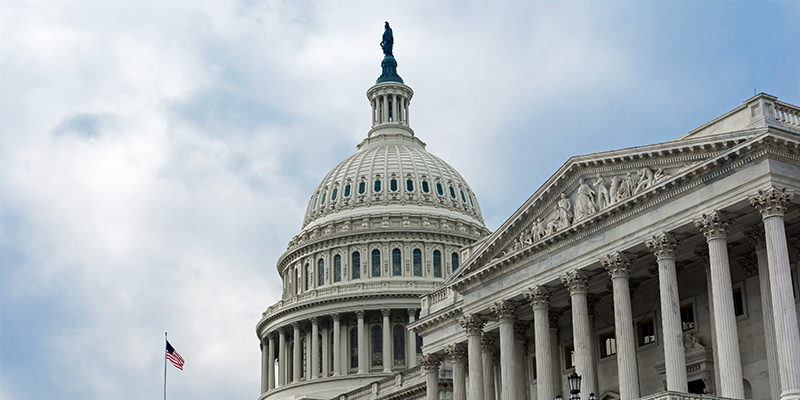In less than two weeks – and for the first time since February 2020 and the start of the COVID-19 pandemic – NAIOP members and chapter local executives will be headed to Capitol Hill to meet with their elected representatives, senators and congressional staff. In so doing, they will be taking the opportunity to establish relationships with newly elected members of Congress, renew and deepen existing ties with incumbents, and talk to their elected officials about issues important to the commercial real estate industry.
All of this occurs as part of NAIOP’s Chapter Leadership and Legislative Retreat (CL&LR), a three-day conference where local NAIOP chapter executives and their leadership come together in our nation’s capital to talk about their chapters, share best practices, and spend a day meeting with their elected federal representatives on Wednesday, Feb. 1, Capitol Hill Day. For much of the next two weeks, NAIOP members coming to Washington, D.C. will be scheduling meetings with their senators and representatives to discuss NAIOP’s 2023 Federal Priorities with them.
For two years, CLLR had to be cancelled because of the pandemic. Congress for this period was essentially closed to the public, with very few in-person meetings held by elected officials or congressional staff with their constituents. Republicans had promised to reopen the House of Representatives to the public if they retook the majority in the midterm congressional elections, and many expected that Democrats would loosen the current restrictions if they prevailed. The GOP win ensures a return to the pre-pandemic protocol at least for the House.
This year, NAIOP’s members will be focusing on three areas when they go to the Hill:
- Adaptive Reuse. Post-pandemic hybrid work trends have led to high office vacancy rates in many cities, with many observers believing that some remote work will be a permanent feature of labor markets. As a consequence, as the long-term leases of office tenants which were entered into before the pandemic expire, these same tenants are expected to need reduced space. In many markets, including San Francisco, Dallas, Houston and New York City to name a few, office vacancy rates are at their highest levels in decades. The negative economic impact on these communities from underutilized and vacant commercial buildings goes beyond the losses to the owners of the buildings. Reduced asset values mean reduced property taxes for local governments, and the reduced economic activity in these areas from less workers being present to frequent local businesses means less sales tax revenue as well. Essential services will need to be scaled back, possibly exacerbating crime, homelessness, and other challenges, leading some economists to call this the “office real estate apocalypse.”
At the same time, communities are facing severe affordable housing supply shortages, with NAIOP chapters and their members being told they need to be “part of the solution” to solving their community’s housing shortage by accepting higher levels of taxation on their businesses to fund government programs. Conversions of vacant and underused commercial structures for housing is seen as a way of addressing both problems, but conversions are often difficult and expensive. Some communities are already providing local incentives to facilitate these conversions. NAIOP and its industry allies will be advocating for the creation of federal incentives to help that effort. - Tax Policy. While many feel that divided government means very little legislation will actually get passed by Congress, the need to educate elected officials on the impact of tax policy on real estate remains an important priority for NAIOP. Capital gains taxes, the continuation of Section 1031 like-kind exchanges, the length of depreciation for real estate assets, and the favorable tax treatment of partnerships are all areas of tax policy critical to the continued vitality of the industry. The constant turnover of elected officials in Congress means that many are new to the issues and may not be familiar with the real estate sector.
Jason Smith (R-MO) is the new Republican chairman of the House Ways & Means Committee, and his committee has experienced extensive turnover since the Tax Cuts and Jobs Act was passed in 2017. President Joe Biden is expected to reintroduce provisions contained in his prior budget submissions, with some tax legislation possibly moving before year end. It is important to educate these newer members on the importance of continuing a supportive tax regime tax for commercial real estate.
- Regulatory Policy. Two major federal regulations will be a focus of NAIOP’s 2023 regulatory agenda: the “Waters of the United States” (“WOTUS”) rule, and the Securities and Exchange Commission (SEC) climate-related financial disclosure regulation. The Biden administration issued a final WOTUS rule on December 30, 2022, even though the Supreme Court expected to render a decision on the issue this spring. The SEC plans to finalize its rule, which requires disclosure of greenhouse gas emissions GHG from tenants and vendors which is difficult for many real estate businesses to provide, by July 2023.
NAIOP has commented on both regulations, directly on WOTUS and as part of a larger real estate coalition on the SEC disclosure rule. While federal regulations are generally the sole province of the executive branch, Congress does have oversight responsibility over the agencies, and both the WOTUS rule and the SEC rule have garnered increased attention from Congress because of their widespread economic impact.
In the past, NAIOP’s Capitol Hill visits served to educate members of congress on the importance of the commercial real estate industry to their districts and states, and to inform them of issues affecting the health of their constituents in the industry. Our united presence on the Hill, with NAIOP members from across the country focusing on the same major priorities, magnifies the importance of commercial real estate in the eyes of Congress. It will be good to return to Capitol Hill this year.














